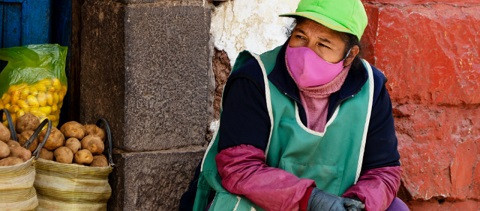
GCED Basic Search Form
Quick Search
أنت هنا
الأخبار

The fourth edition of the UNESCO Regional Expert Consultation Series held on 9 October 2020 focused on addressing the issue of racism and discriminations in the Latin America and the Caribbean region.
The consultation brought together diverse speakers such as José Francisco Calí Tzay, UN Special Rapporteur on the rights of indigenous peoples (Guatemala), María Elisa Velázquez Gutiérrez, Sociologist, anthropologist, researcher on Afro-descendants and cultural diversity at the National Institute of Anthropology and History (Mexico), Myriam Elizabeth Suarez Garcia, Executive Coordinator of the Secretariat of Ethnic-Racial Equality and Migrant Populations of the City of Montevideo (Uruguay), Carla Moore, Artist, activist, and lecturer at the Institute for Gender and Development Studies (Jamaica), Sindis Meza, Program Officer, Ford Foundation (Colombia), Matheus Gato de Jesus, Professor, Department of Sociology, the University of Campinas (Brazil), Rina Cáceres, Member of the International Scientific Committee of the Slave Route Project, Professor (Costa Rica). This edition was moderated by Jembell Chifundo, poet and Afro-descendant activist from Colón, Panama. The panel’s composition allowed shedding light on different features of the problem across the continent and also developing a broader set of recommendations.
A point of convergence amongst all speakers was the need to create a “new narrative” on racism and discriminations. Such efforts would require clarification of the concepts of ‘race’, ‘slavery’ and ‘slave’, which, in their current construction reverberate to a large extent racist prejudice. They should also be anchored in a holistic approach that takes into account the intersection of racism with other forms of discrimination, including those based on gender, social status, sexual identity, etc. and builds on a closer interaction between all categories of actors.
The next step is rewriting “history” and elaborating a new pedagogy that will be free from persisting stereotypes (for instance moving away from the folklorization of indigenous peoples and their traditions) and will communicate the experiences and realities of people that have historically been subject to discrimination.
As regards education, this new approach should explicitly tackle, from an early age, the widespread lack of self-esteem in children belonging to minorities that often face exclusion and marginalization. At the same time, education should become more culturally appropriate and the active and meaningful participation of indigenous peoples and people of African descent would play a decisive role in achieving that goal.
A second broader recommendation pertained to improving the use of established frameworks, platforms, and processes. The experts coincided with the need to strengthen the follow-up to the International Decade for People of African Descent (2015-2024), inter alia by promoting greater participation of civil society actors.
Several of UNESCO’s initiatives were seen as particularly relevant for upscaling the fight against racism and discriminations. One such example was the Slave Route Project. The Project could be expanded, building on its past achievements and legacy. Another example is the Latin American and the Caribbean (LAC) Coalition of Cities against Racism, Discrimination, and Xenophobia, with its important work on intersectionality.
The speakers also provided valuable recommendations on the strengthening of the legal and policy frameworks and on the enhancement of their implementation.
Investment in data disaggregation, improved methodologies for data collection and comparability of practices and approaches across borders were considered of capital importance for sharpened situation analysis and better-tailored action. The latter could include increased budget allocation in support of groups that have remained in the margins, notably to improve access to quality services, strengthened capacity building of city administrations and the city nomenclature, and greater use of affirmative action.
Organized by the Social and Human Sciences Sector, the Series of Regional Expert Consultations on Racism and Discriminations aims to unpack the societal challenges of the COVID-19 pandemic related to racism and discriminations, and seeks to facilitate the necessary deep reflection on what direction the international community should take amid a renewed emergence of racist agendas.
Since September 18, UNESCO held three consultations focusing on the African region, North America and Europe. The last two editions of the series on the Asia-Pacific and the Arab regions are scheduled for the 20th and the 21st of October, respectively.
URL:
